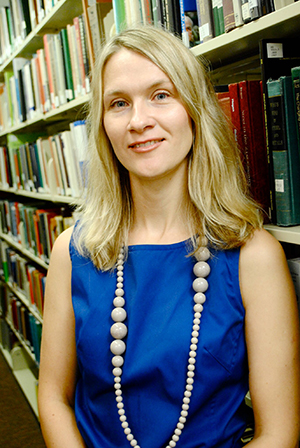Research Update: Q&A with Asta Zelenkauskaite, PhD
October 22, 2018
Asta Zelenkauskaite, PhD, is an associate professor of communication and of communication, culture and media in Drexel’s College of Arts and Sciences.
 Asta Zelenkauskaite, PhD
Asta Zelenkauskaite, PhD
Describe your current research project.
I have been working on the interplay between mass media and social media by arguing for user-centric approaches. My current project, “Trolling the Comments,” focuses on commenting behaviors in news portals and commentators’ perceptions about targeted and/or automated forces, which I call ideological trolling. My argument is that internet trolling is an information battlefield where oppositional forces aim at one goal — to create mistrust, chaos and division —rather than to foster a healthy democratic debate.
Why does this research matter to your field? To other fields?
Online comments — including trolling — have become parallel to mass media. With the rapidly changing news cycle, online news commenting serves not only as a space to comment, but also as a reference point to interpret the news story. It is critical to understand the reflection of trolling through these new online spaces.
I see this work as part of the larger research on ideological internet trolling functioning as the information warfare battlefield, where tactics such as offense and defense appear to be employed by “regular users” in debates, but are actually orchestrated by bots and oppositional forces that aim to create mistrust and division. This expression of ideology takes place through technological means and through (perceived) developed tactics in online news portals.
What are some potential applications of this research?
Ideological trolling becomes a divisive mechanism, particularly within vulnerable populations, even if paradoxically encouraged and supported by democratic principles. Is oppositional rhetoric that disseminates distrust a dangerous tool, or a healthy democratic mechanism? In the democratic context, debate is encouraged. At the same time, what happens when that debate does not lead to any clarity?
This research has potential to create better systems to foster healthier debates in online contexts. It can not only provide insight into related media literacy initiatives, but also can open a larger debate within media institutions.
Has anything exciting or surprising come out of the research so far?
Two publications came out of this project so far. Both of them deal with Lithuanian news portals. The Lithuanian media has extensively covered Russian government interference in online contexts; thus, it was a meaningful space to analyze how the topic is discussed in online comments.
This study analyzed Russian trolls, i.e., user perceptions regarding which online comments are attributed to the Russian-government paid commentators who populate news portals to spread pro-Russian propaganda. The study shows that “trolls” were called out more frequently in responses to the comments.
Also, trolling rhetoric was used as a “calling out” technique, where the comment itself triggers others to point out that only a paid Russian troll could have written such a message. In response, defensive rebuttal comments included blame comments, otherwise popularly known as a “whataboutism” – presenting counterarguments on unrelated but sensitive topics. Ultimately, this work shows that trolling defense rebuttal rhetoric can be used as a tool to create division.
The second study analyzed commenting patterns and the location of the commentators in the Russian-language Lithuanian news portals. The most surprising finding was that, while the largest proportion of comments (53 percent) was from Lithuania and the second largest from Russia (17 percent), the third largest proportion (8 percent) was from locations that were intentionally masked. These finding suggest that Lithuanian online public sphere is an information battleground where users choose not to have their messages traceable by IP.
I am in the process of analyzing USA online news portals using similar approaches.
Are students involved in the project? Are there opportunities for students to get involved?
Three students have worked on this project so far with me. Brandon Niezgoda, PhD communication, culture and media '17, co-authored the first study described above. Niayla-dia Murray, an undergraduate philosophy and political science major, has been involved in the subsequent phases of research as a Drexel Honors project. She has collected a targeted sample from online news portals and analyzed instances of interaction that involve ideology and trolling. Daniel Drexler, a master’s student in science, technology and society, has been critical in his technical knowledge in creating a software to automatically gather data for a part of the USA data collection.
I do welcome students who want to know more about these topics or be part of this project as it expands to U.S. online news portals. It is a great opportunity not only to engage a project in a hands-on way, but also to be exposed in some of the detection techniques of trolling behaviors online. I welcome students with various backgrounds, and no previous experience in research is required. There are various ways to contribute: merely join the team to try it out; conduct a stand-alone project for an independent study and/or work on a co-authored publication or conference presentation.
Do you have any advice for students who aspire to conduct research in your field?
I believe in learning by doing. I encourage students to do so. For me, research, first, is about the curiosity and, second, it is about creativity — developing the skills to capture what is sometimes difficult to see. Please contact me at az358@drexel.edu if you are interested in this topic.
Are there opportunities for collaboration with other researchers in the College of Arts and Sciences?
I strongly believe in a collaborative research environment where each member brings a specific area of expertise. For example, data for the Lithuanian news portal comments was extracted with the help of my former colleague in the College of Computing and Informatics, Marcello Balduccini, PhD. Most of my work has been collaborative in nature, and I would love to have a discussion of this topic across units at CoAS and beyond.